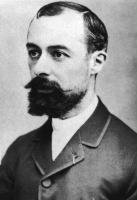| www.tmatlantic.com
Test & Soldering Equipment On-line Store |
|
D.E.V.I.C.E. (Wiki)Calculators Services |
|||||
Filter by first letter
|
Becquerel, Henri
Becquerel, Antoine Henri was born on December 15, 1852. He was a French engineer, physicist, Nobel laureate, and the first person to discover radioactivity. Becquerel’s earliest work was concerned with the plane polarization of light, with the phenomenon of phosphorescence and with the absorption of light by crystals. He also worked on the subject of terrestrial magnetism. In 1896, his previous work was overshadowed by his discovery of the phenomenon of natural radioactivity. Following a discussion with Henri Poincaré on the radiation which had recently been discovered by Röntgen (X-rays) and which was accompanied by a type of phosphorescence in the vacuum tube, Becquerel decided to investigate whether there was any connection between X-rays and naturally occurring phosphorescence. . He had inherited from his father a supply of uranium salts, which phosphoresce on exposure to light. When the salts were placed near to a photographic plate covered with opaque paper, the plate was discovered to be fogged. The phenomenon was found to be common to all the uranium salts studied and was concluded to be a property of the uranium atom. Later, Becquerel showed that the rays emitted by uranium, which for a long time were named after their discoverer, caused gases to ionize and that they differed from X-rays in that they could be deflected by electric or magnetic fields. For his discovery of spontaneous radioactivity Becquerel was awarded half of the Nobel Prize for Physics in 1903, the other half being given to Pierre and Marie Curie for their study of the Becquerel radiation. The SI unit for radioactivity, the becquerel (Bq), is named after him. Citing nobelprize.org |
|
Site mapPrivacy policyTerms of Use & Store PoliciesHow to BuyShippingPayment |

























